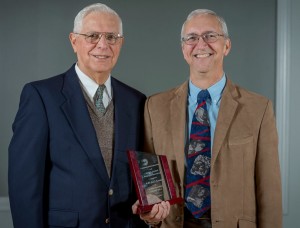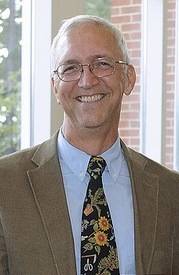UNC Charlotte Psychology Professor James R. (Jim) Cook has received a top statewide honor for linking community service to classroom study and reflection.
The North Carolina Campus Compact, a coalition of 38 public and private colleges and universities, named Cook as the recipient of its 2014 Robert L. Sigmon Service-Learning Award. Cook received the award at the network’s annual community engagement conference in Wilmington on February 5, 2014. The Sigmon Award recognizes one faculty member in the state for significant contributions to the practice of service-learning. North Carolina native Robert Sigmon, for whom the award is named, pioneered the approach in the 1970s.
This is the latest in a series of awards recognizing the work of Cook and his colleagues. Cook recently was named the first recipient of the Provost’s Faculty Award for Community Engagement. Established in 2012, the award honors a tenured faculty member whose teaching, research and service embodies the university’s commitment to civic involvement and whose work strengthens the relationship between UNC Charlotte and the larger community.
Last summer, UNC Charlotte’s community psychology training program received the Outstanding Program Award from the Society for Community Research and Action – the American Psychological Association’s Community Psychology Division. Cook is a leader in that effort.
Over his 30 years at UNC Charlotte, Cook has led the creation and evaluation of projects and partnerships that meet Charlotte’s most pressing human needs, secured millions of dollars in grant funding to support these projects, and trained students to be system-wide change agents and skilled individual practitioners.
Cook helped found Mecklenburg County’s Homeless Services Network; led the evaluation and improvement of the MeckCARES partnership among local child-services agencies; and led a HUD-funded effort that resulted in the creation of the Community Development Academy, which increased the university’s support for low-income neighborhoods and families. Scores of students have worked as volunteers, interns and researchers to support these and other community-based projects.
 At UNC Charlotte, Cook has helped develop numerous related programs and courses, including a doctoral program in health psychology, a community psychology master’s degree program, and a community psychology learning community for undergraduates. A former student, who now leads the program evaluation group at the Yale School of Medicine, says: “In two short years I completed a class requirement with a community agency, was on the board of directors at another, and became connected to the UNC (Charlotte) Urban Institute. . . . I know that Jim provided me with an excellent foundation in community psychology and community-engaged work.
At UNC Charlotte, Cook has helped develop numerous related programs and courses, including a doctoral program in health psychology, a community psychology master’s degree program, and a community psychology learning community for undergraduates. A former student, who now leads the program evaluation group at the Yale School of Medicine, says: “In two short years I completed a class requirement with a community agency, was on the board of directors at another, and became connected to the UNC (Charlotte) Urban Institute. . . . I know that Jim provided me with an excellent foundation in community psychology and community-engaged work.
Started in 2002 and hosted by Elon University, North Carolina Campus Compact builds the capacity of colleges and universities to produce civically-engaged graduates and strengthen communities. The statewide network is one of 34 state affiliates in the national Campus Compact organization, which claims over 1,200 member campuses.
(Shown: top image: Cook; bottom image: Sigmon (left) and Cook.)








